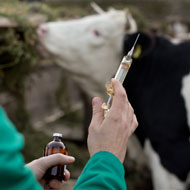Vets working to reform OV training and revalidation

“The unprecedented response rate to this survey really hits home the strength of feeling on this issue."
The BVA is spearheading reforms to the training and revalidation system for official veterinarians (OVs), after a survey revealed many are frustrated with the current process.
Nearly 1,300 BVA members responded to the survey, many of whom criticised the system.
Respondents who chose to drop qualifications cited reasons such as time, lack of relevance, the cumulative cost of renewing each module at regular intervals and duplication of learning across different modules.
Over a quarter (25.3 per cent) of vets who hold the Essential Skills OCQ under grandfather rights, said they were not planning to renew the qualification. Of these, 66 per cent said they find the requirements too onerous.
The survey suggests vets are particularly frustrated with export certification OCQs, most of which needed revalidation this summer. Under the current system, equine exports are included in the ungulate export OCQ, which was a concern for vets who only work with farm animals.
APHA and Improve International, which deliver the current system, have introduced an equine-only OCQ for exports, to better meet the needs of equine vets.
Nearly three-quarters (72.5 per cent) of respondents who hold grandfather rights to the avian export OCQ, and nearly half (47.1 per cent) of those who hold the animal products OCQ, are not planning to renew their qualifications.
BVA had a meeting with the APHA to discuss the survey results and explore practical solutions to these problems. BVA has agreed to review the modules and come up with a list of recommendations to improve the structure.
John Fishwick, BVA president, said: “The unprecedented response rate to this survey really hits home the strength of feeling on this issue. There is an urgent need to review and improve the revalidation process to safeguard against capacity and capability issues in this critical section of the workforce.
“It’s really positive that APHA recognises that there are issues with the current system and is keen to work with us to make it more proportionate and fit for purpose while continuing to maintain high standards.
“It’s more important than ever to retain skilled professionals so that the workforce is at full strength to respond robustly to disease outbreaks and meet demand for export certification after Brexit.”



 The Federation of Independent Veterinary Practices (FIVP) has announced a third season of its podcast, Practice Matters.
The Federation of Independent Veterinary Practices (FIVP) has announced a third season of its podcast, Practice Matters.